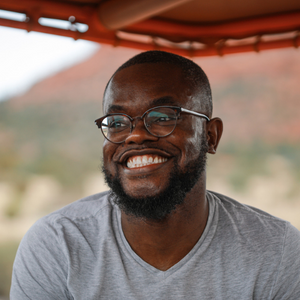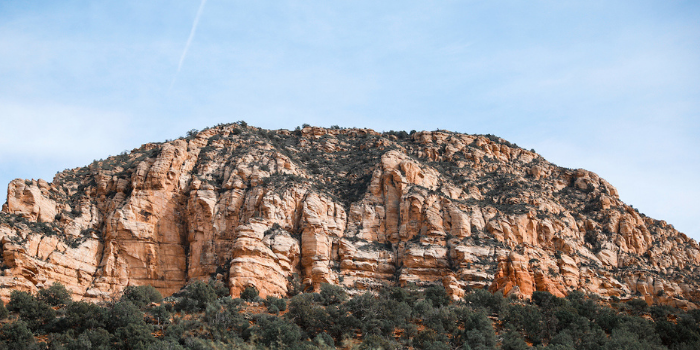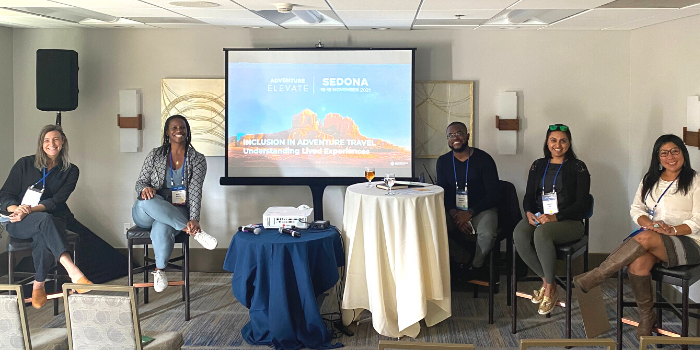Understanding and being empathetic of lived experiences is at the core of inclusion. In a 90-minute session at AdventureELEVATE in Sedona, Arizona, we openly explored this topic with a group of panelists who represented their authentic selves in a raw exchange of thoughts, emotions, and experiences with regards to white supremacy, colonialism, and privilege in travel. Attendees were asked to be part of the conversation, be real, and to NOT look to the panelist for all the answers which created a unique opportunity for an open dialogue unimpeded by social constraints that can typically plague conversations about diversity.

Session moderator, Lawrence Phillips, is a Diversity, Equity and Inclusion (DEI) Consultant and Founder & CEO of Green Book Global, the world’s first black travel review site. His platform is dedicated to inspiring and empowering black travelers to confidently explore the world through the sharing of Traveling While Black experiences and his goal is to make it the go-to travel booking platform for black travelers worldwide.
As the facilitator, Lawrence expertly led a very difficult conversation in such a way that the discussion was both meaningful and impactful. One attendee shared,
“The Inclusion in Adventure Travel: Understanding Lived Experiences session was perhaps the best conference session I have ever attended in my life--the honesty, transparency, vulnerability, pride of each panelist in sharing their stories and engaging with audience members about difficult topics…It's almost two weeks later, and I still can't stop thinking about it."
Preparation for the Session – Creating a Space for Meaningful Conversations
These authentic conversations are important to moving the industry closer to providing diverse representation in adventure travel, but the facilitation of these types of sessions are almost as important. This is why the Adventure Travel Trade Association (ATTA) connected with Lawrence to see what he did to facilitate such a talk.
“First, I spent hours ensuring my heart, mind, and spirit were in the right space leading up to the session,” says Lawrence. “I hate surface-level conversations about diversity. In order to have real change you have to have real conversations.”
One of the things that Lawrence likes to do to prepare for DEI conversations is listen to a sermon series on real love from his pastor at Renaissance Church in NYC. In those sermons, one of the primary messages is that the concept of love in this world is distorted.
- There is a love that is based on affection which is similar to the feeling you have for a loved one.
- There is a love that is based on romance/passion, but once the passion diminishes, we conceive the love is gone.
- There is a love that is based on friendship, which is built on common interests.
What we don’t see too often in this world is a love that is built on sacrifice–agape love. Love that isn’t born just out of emotions, feelings, familiarity, or attraction, but as a choice. A love that is based on the faithfulness, sacrifice, and the betterment of someone else with no gain to you.
Lawrence says, “People really overcomplicate diversity, in my opinion. It’s actually very simple. It really comes down to the golden rule of loving thy neighbor as you would yourself and that is the basis of all my talks with Diversity, Equity, and Inclusion.”
Preparation for the Session – A Focus on the Panelists
 Another aspect that Lawrence mentioned as part of his preparation is spending time researching and understanding more about the panelists to ensure they have an opportunity to share their experiences in an organized, meaningful, and authentic fashion.
Another aspect that Lawrence mentioned as part of his preparation is spending time researching and understanding more about the panelists to ensure they have an opportunity to share their experiences in an organized, meaningful, and authentic fashion.
“As a moderator, you are in control of the flow of conversation. How can you control the flow of a delicate subject like Inclusion in an efficient and impactful way if you don’t know your panelists? You can’t.” says Lawrence. “So even in our very first introductory meeting I had already researched each panelist and had topics of conversation that I was prepared to discuss.”
Additionally, at AdventureELEVATE, Lawrence had several opportunities to get to know the panelists. This was key because it helped him understand their style, important topics they would like to discuss, allowed for last-minute changes, and even offered an opportunity to ask permission to have conversations that may end up being more sensitive or traumatic than previously thought.
The Session

The session had an amazing set of panelists whose lived experiences really helped frame a thoughtful conversation on inclusion in adventure travel.
- Nailah: Founder and CEO of Color Outside, Nailah works to create a safe place for women of color to come together and create unapologetic, soul-stirring lives through reconnecting to their joy by outdoor adventures.
- Jaylyn: Founder and Executive Director of Native Women’s Wilderness (NWW), Jaylyn is from the Diné (Navajo) Tribe in New Mexico. It is her goal for NWW to be a platform for Native voices, a place to express the love and passion for the Wild, and to provide education of the ancestral lands.
- Justine: Executive Director and Co-Founder of Adventure Mama’s Initiative, Justine’s non-profit provides access to nature and challenge-based experiences, educational sources, and a dynamic community of mothers to help support maternal wellness.
- Preeti: Founder and CEO of Adventure Tripr, Preeti wants to create a sense of belonging and remove barriers to outdoor space with the creation of her global, curated marketplace for adventure travel sourced by local operators and guides.
Although there were a variety of important topics discussed, one important conversation to highlight was related to colonialism. After playing the song, “This Land is Your Land,” Lawrence asked the audience what they thought about the song. Historically this song is about inclusion and equality; one of the lyrics even says “this land was made for you and me.” However, in actuality, it is a direct reference to the inequality and exclusion of Indigenous people. A song that has been played in millions of households, played at the Super Bowl, and at Obama’s inauguration, it is a constant reminder to Indigenous people that their land was stolen. Something that you think is doing good can be emphatically detrimental to a community if you do not make space for those voices to be part of the conversation.
This opened the dialogue about decolonizing travel and a consistent theme emerged—travel is a privilege. It was also discussed that while many organizations want to have conversations about diversity, they often ask BIPOC* creators, influencers, writers, etc. to participate without being paid for their time and contributions. Despite what might be well-intentioned efforts on the part of the white majority, bringing diverse people to the table without paying them goes against the effort of making an inclusive space. In essence, this is literally helping to continue the idea of colonization and highlights the pay-gap that the BIPOC community faces in the travel space and more broadly.
Participants even revisited their own trauma in this session when Lawrence mentioned the idea of being “not racist” vs being “anti-racist.” Much of being an advocate in the Diversity, Equity, and Inclusion space is not just agreeing to an idea (being not racist) but also putting that idea into action (being anti-racist). Lawrence showed a graphic that outlined the different examples of overt and covert racism which led to a very open and vulnerable discussion from panelists and participants alike.
Some additional takeaways from the session:
- If things are going to get better, white people need to stop putting it on the BIPOC community to fix a system they did not create
- Saying you are colorblind is dismissive
- The bootstrapping mentality that “everyone can succeed” needs to be dismantled
- Take the tenacity that you used to build your business and apply it to learning about and improving DEI in your industry
- Make the success of BIPOC people equally as important as your success
- Pay BIPOC creators, writers, speakers, panelists, moderators, etc
“Love your neighbor as you love yourself” is the basis of inclusion conversations. The unfortunate murder of George Floyd at the hands of the Minnesota Policy department has made DEI conversations the new cool thing. Do not let your Diversity, Equity, and Inclusion efforts be a trend. Remember, love isn’t just a feeling, it is an action.
*BIPOC stands for Black, Indigenous, and People of Color. The term BIPOC is significant in recognizing that Black and Indigenous people are severely impacted by systemic racial injustices; however, marginalized groups worldwide can also be considered in this article where BIPOC is mentioned.
